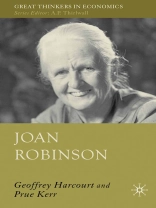Joan Robinson is widely considered to be amongst the greatest economists of the 20th Century. This book provides a comprehensive study of her life and work, examining her role in the making of The General Theory, her critical interest in Marxian economics, her contributions to Labour Party policy and her writings on development, especially China.
Tabella dei contenuti
Preface Acknowledgements Figures Introduction The Economics of Imperfect Competition Joan Robinson and her circle in the run up to, and the aftermath of The General Theory Marx in Joan Robinson’s Argument Joan Robinson and socialist planning in the years of high theory The Making of The Accumulation of Capital The Choice of Technique in the Economy as a Whole and the Cambridge Debates in the Theory of Capital:Joan Robinson’s Role. After The Accumulation of Capital: Defence and Development Joan Robinson’s Contributions to Development Economics as Political Economy An Introduction to Modern Economics: a Light that Failed? A Concerned Intellectuals Task: Joan Robinson’s Three Popular Books Conclusion: Joan Robinson’s Legacy References
Circa l’autore
G. C. HARCOURT was born in 1931 in Melbourne, Australia. He is a graduate of the Universities of Melbourne and Cambridge. He has taught mainly at Adelaide and Cambridge Universities, and was a friend and colleague of Joan Robinson for many years. He is co-author and co-editor of 25 books including seven volumes of selected essays and 230 papers in learned journals and edited volumes. His books include Some Cambridge Controversies in the Theory of Capital, Post-Keynesian Essays in Biography, 50 Years a Keynesian and other Essays, Selected Essays on Economic Policy and The Structure of Post-Keynesian Economics.
PRUE KERR was a friend and associate of Joan Robinson in Cambridge. She edited, with Geoffrey Harcourt, the five volume:
Joan Robinson: Critical Assessments of Leading Economists. She was supported by the Institute of Advanced Studies at the University of Bologna and the CPEST. She now works on post-Keynesian economic theory.












